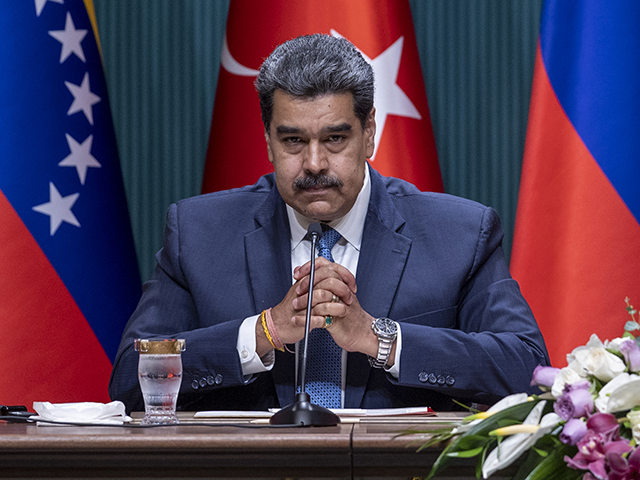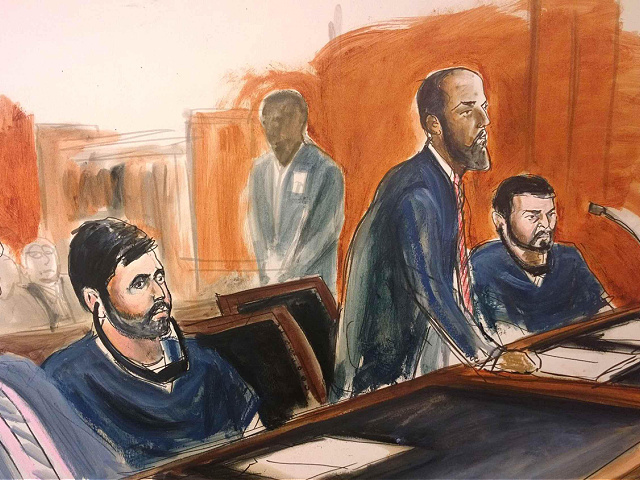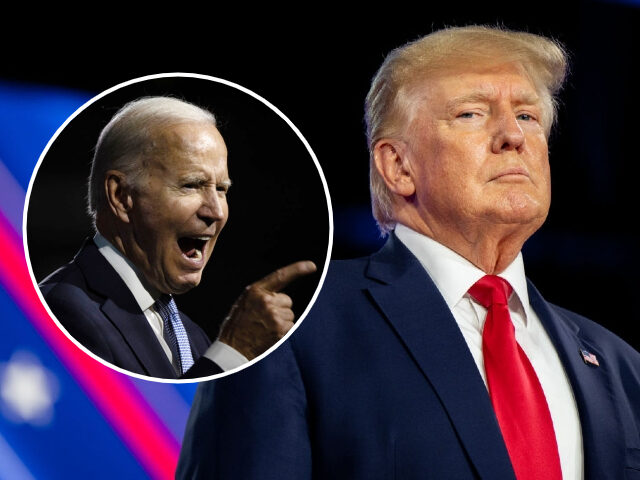The Biden administration’s exchange of two convicted Venezuelan drug traffickers related to socialist dictator Nicolás Maduro in exchange for seven imprisoned American citizens drew a barrage of criticism this weekend, particularly given the precedent set by the Trump administration with the release of American citizen Joshua Holt.
Holt, unjustly imprisoned in one of Venezuela’s most notorious political prisoner torture centers, was freed in 2018 after two years behind bars. President Donald Trump did not free any Venezuelan criminals associated with the regime or make any overt concessions to ensure Holt’s release.
On Saturday, the Biden administration announced that it had negotiated a prisoner swap with the Maduro regime that released seven detained American citizens — most of them executives for the oil corporation Citgo — in exchange for Efraín Antonio Campo Flores and Francisco Flores de Freitas, dictator Maduro’s convicted drug-trafficking nephews.
Flores and Flores de Freitas had been sentenced to 18 years in prison in America for cocaine trafficking after the DEA caught them trying to move 800 kilograms of cocaine, believed to belong to the Marxist Revolutionary Armed Forces of Colombia (FARC) terrorist organization, into U.S. soil.
During his presidential campaign, supporters heavily insisted that Biden would not “negotiate with dictators” and a potential Biden administration would increase sanctions against the Maduro regime. The Biden administration has done the opposite, liberating drug traffickers related to Maduro — himself the target of a U.S. Department of Justice $15 million bounty for engaging in narco-terrorism, corruption, and drug trafficking. Drug crime experts consider Maduro’s regime one of the most lucrative and influential drug syndicates in the world.

Venezuelan President Nicolas Maduro makes statements during a joint press conference with Turkish President Recep Tayyip Erdogan (not seen) after the bilateral and inter-delegation meetings in Ankara, Turkiye on June 08, 2022. (Aytac Unal/Anadolu Agency via Getty Images)
The “Narco-Nephews” trade was followed by the removal in June of another of Maduro’s close relatives from the U.S. government list of sanctioned individuals: Carlos Erik Malpica Flores, the former head of the state oil company Petróleos de Venezuela (PDVSA).

In this December 17, 2015, file courtroom sketch, two nephews of Venezuela’s first lady, Efrain Antonio Campo Flores, second from left, 29, and Franqui Francisco Flores De Freitas, right, 30, appear in Manhattan federal court at their arraignment on cocaine-smuggling charges, in New York as their defense attorneys Kafahni Nkrumah, left, and Vincent Southerland, standing, represent them. (Elizabeth Williams via AP)
The Biden administration has also eased up some of the sanctions imposed upon the socialist regime, allowing the Maduro regime to ship oil to European companies in July oil-for-debt exchanges, were paused by PDVSA in August 2022.
The Biden administration appeared to, at least anonymously, acknowledge the trade this weekend as a loss. As reported by Politico, a senior Biden Administration officer described the swap as a “painful decision,” but the release of Maduro’s nephews was “one particular step” towards the release of the American citizens.
Spain’s El Mundo newspaper deemed the prisoner exchange a personal victory for the socialist dictator — made more celebratory by the regime as the administration’s October 1 announcement coincided with the quasi-mandatory date that Maduro’s socialist regime now chooses to start the Christmas season in Venezuela.
Biden’s prisoner swap with Maduro was met with backlash. Sen. Marco Rubio (R-FL) described it as “another Biden appeasement that will result in more anti-U.S. dictators taking more innocent Americans hostage in the future.”
Today Biden released two convicted drug dealer nephews of #Venezuela dictator Maduro in exchange for 7 innocent Americans being held hostage
Another Biden appeasement that will result in more anti-U.S. dictators taking more innocent Americans hostage in the future
— Marco Rubio (@marcorubio) October 1, 2022
Juan Guaidó, Venezuela’s legitimate but powerless president, released an official statement distancing himself from the deal, insisting his government had no involvement in the matter.
“This proves once again that a criminal regime operates in Venezuela, linked to drug trafficking, which (as we have insistently denounced) in addition to being a threat to the security of people of any nationality in the country, is a risk for the entire region. and the hemisphere,” the statement read.
Carlos Vecchio, Guaidó’s ambassador to the United States, commented through Twitter that “the release of narco-nephews could establish a precedent of impunity by giving incentives to the Maduro dictatorship (and others) to continue oppressing and committing crimes.”
Maduro ha secuestrado ciudadanos de EEUU para luego utilizarlos como fichas de canje. Liberación de narcosobrinos podría establecer precedente de impunidad al dar incentivos a dictadura de Maduro (y otras) para seguir oprimiendo y delinquiendo. Todo dependerá de acciones futuras. https://t.co/OJRw626GfK
— CARLOS VECCHIO (@carlosvecchio) October 2, 2022
Members of the Venezuelan opposition also commented on the matter. The Venezuelan opposition party Primero Justicia (“Justice First”) released a statement on Monday announcing that it had no prior knowledge on the prisoner swap between the Biden administration and the Maduro regime, asserting that releasing Maduro’s two convicted drug trafficking nephews “does not benefit the people of Venezuela.”
Failed perennial presidential candidate Henrique Capriles Radonski commented, “the United States always defends its interests, Maduro [defends] his and his leadership’s [intersts] and we who are the rest, millions of Venezuelans, have to continue fighting for the interests of the homeland, of our Venezuela, especially of the most forgotten.”
Sobre la noticia del día: los EUA siempre defienden sus intereses, Maduro los de él y su cúpula y nosotros los que somos el resto, millones de venezolanos, tenemos que seguir luchando por los intereses de la patria, de nuestra Venezuela, especialmente de los más olvidados
— Henrique Capriles R. (@hcapriles) October 1, 2022
María Corina Machado, a Venezuelan conservative opposition party leader, catalogued the prisoner swap as a “grave error,” stating that the exchange “generates perverse incentives in favor of drug trafficking and international kidnapping, disregards human rights, conveys weakness in the greatest Western democracy,” and “degrades the fight for freedom in Venezuela.”
Gravísimo error.
1. Sacrifica la justicia por la “pax criminal”
2. Genera incentivos perversos a favor del narcotráfico y del secuestro internacional
3. Desprecia los DDHH
4. Transmite debilidad en la mayor democracia occidental
5. Degrada la lucha por la libertad en Venezuela— María Corina Machado (@MariaCorinaYA) October 2, 2022
The situation presents a sharp contrast to Maduro’s release of Joshua Holt in 2018.
In 2018, the Trump administration successfully negotiated the release of Joshua Holt, an American citizen held hostage by the Maduro regime after Holt had traveled to Venezuela to marry his wife. Holt was held without trial for two years in a Venezuelan prison until his release. No prisoner swap with the Maduro regime was needed for the release of Holt.
Holt, a Mormon missionary from from Utah, traveled to Venezuela in 2016 to marry his fiancée, Thamara Caleño, but was arrested by Venezuelan police, who accused him of stockpiling an AK-47 assault rifle and grenades at his fiancée’s family home.
Holt recounted that he was sent to El Helicoide (“the Helix”), an unfinished drive-through shopping mall built in the late 1950s that now serves as one of the Bolivarian Intelligence Service (SEBIN) political prisons in the country.
Throughout the two years that he was imprisoned in the Helicoide, Holt was subject to inhumane treatment, such as being forced to perform calisthenics naked in violation of his religious beliefs, and suffered numerous health complications and infections including pneumonia.
In May 2018, shortly before his release, Holt’s life was endangered during a riot that broke down in the prison.
“Helicoide the prison where I am at has fallen [sic] the guards are here and people.are trying to break in my room and kill me [sic],” Joshua Holt wrote in a now deleted Facebook post.
Rather than soften his stance against the Maduro regime after the release of Joshua Holt, Trump doubled down against the socialist regime, sanctioning his wife and other members of his inner circle in September 2018 alongside companies either owned or controlled by them.
The Trump administration further sanctioned the Maduro regime between 2019 and 2020, imposing sanctions on Venezuela’s state-oil company PDVSA in January 2019, more members of the regime in February, sanctions on Maduro’s son in June 2019, and sanctioning the state-owned airline Conviasa in 2020, among other sanctions.

COMMENTS
Please let us know if you're having issues with commenting.